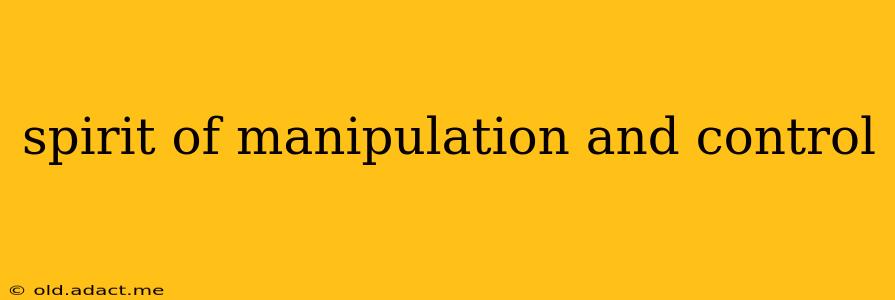The "spirit of manipulation and control" refers to a pervasive mindset characterized by a desire to dominate and influence others, often at the expense of their autonomy and well-being. This isn't simply about isolated acts of manipulation; it's a deeper psychological pattern driven by various underlying needs and insecurities. Understanding this spirit is crucial for recognizing it in ourselves and others, fostering healthier relationships, and building a more equitable society.
What Motivates the Spirit of Manipulation and Control?
The desire for manipulation and control stems from a complex interplay of factors. It's rarely a singular cause, but rather a confluence of underlying issues. Some key motivations include:
-
Insecurity and Low Self-Esteem: Individuals who feel insecure or lack self-worth may attempt to control others to compensate for their internal feelings of inadequacy. Controlling their environment and the people within it provides a sense of power and validation they lack within themselves.
-
Fear of Abandonment or Rejection: A deep-seated fear of being alone or rejected can drive manipulative behaviors. By controlling others, these individuals believe they can prevent abandonment and maintain a sense of connection, even if that connection is unhealthy.
-
Need for Power and Dominance: Some individuals are driven by a need for power and dominance, seeking to exert control over others to feel superior and in charge. This can manifest in various forms, from subtle coercion to overt aggression.
-
Past Trauma or Abuse: Experiences of past trauma, abuse, or neglect can profoundly impact an individual's ability to form healthy relationships. They may develop manipulative tendencies as a defense mechanism or a way to regain a sense of control after experiencing significant loss of control in their lives.
How Does Manipulation and Control Manifest?
The spirit of manipulation and control manifests in various ways, often subtly and insidiously. Recognizing these tactics is crucial in protecting oneself and others:
-
Gaslighting: This involves distorting reality to make someone question their own sanity and perception of events.
-
Emotional Blackmail: Using guilt, fear, or obligation to manipulate someone into doing something they don't want to do.
-
Coercion and Threats: Using intimidation and threats to force compliance.
-
Passive-Aggression: Expressing anger or resentment indirectly through subtle behaviors, like sulking or procrastination.
-
Lying and Deception: Intentionally misleading or deceiving someone to achieve their own ends.
-
Love Bombing: Overwhelming someone with affection and attention initially, only to later withdraw it as a means of control.
How Can I Identify if I am Exhibiting Manipulative Behaviors?
Self-reflection is key. Ask yourself:
- Do I often feel a need to control outcomes or people's actions?
- Do I frequently use guilt, threats, or other tactics to get my way?
- Do I disregard the feelings or needs of others to achieve my goals?
- Do I frequently lie or deceive others?
- Do I find myself justifying my actions, even when they are hurtful?
If you answered yes to several of these questions, seeking professional help from a therapist or counselor could be beneficial. Recognizing and addressing these behaviors is crucial for building healthy relationships and fostering personal growth.
What are the long-term effects of a manipulative relationship?
Living with manipulation and control can have devastating long-term effects on mental and emotional well-being. Victims often experience:
- Low Self-Esteem: Constant belittling and gaslighting erode self-confidence.
- Anxiety and Depression: The stress and uncertainty of a controlling relationship can lead to significant mental health challenges.
- Trauma: Experiences of manipulation and abuse can cause post-traumatic stress disorder (PTSD).
- Difficulty in Forming Healthy Relationships: Past experiences can make it challenging to trust and build healthy relationships in the future.
This exploration of the spirit of manipulation and control aims to provide a deeper understanding of this complex issue. By recognizing the underlying motivations and common tactics, we can better protect ourselves and work towards fostering healthier, more equitable relationships. Remember that seeking professional help is a sign of strength, and there is support available for both individuals who exhibit manipulative behaviors and those who are affected by them.
